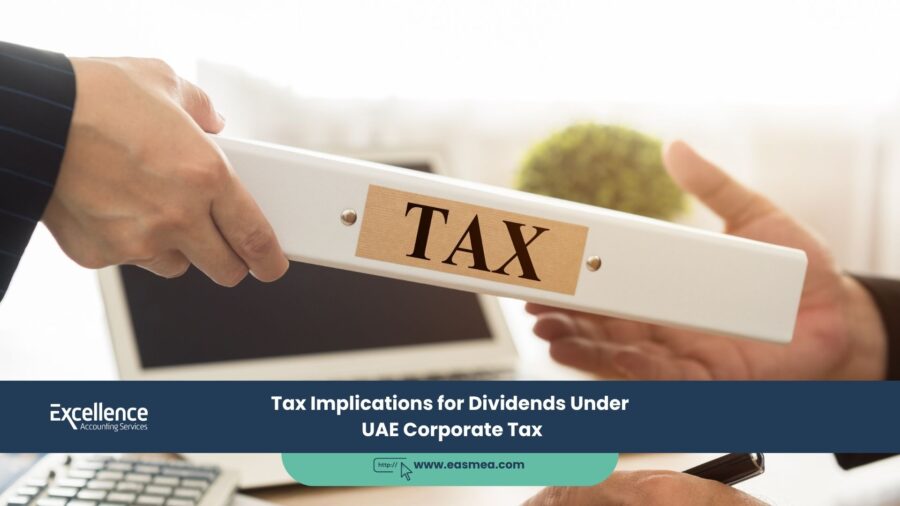Tax Implications for Dividends Under UAE Corporate Tax
The flow of dividends is the lifeblood of corporate investment. For shareholders, it represents the return on their capital; for holding companies, it is the primary mechanism for pooling profits and reallocating resources. With the introduction of the UAE’s Corporate Tax regime, the tax treatment of these crucial financial flows has come under sharp focus. The legislation has been carefully crafted to prevent the economic double taxation of corporate profits, thereby reinforcing the UAE’s status as a premier hub for international business and investment.
- Tax Implications for Dividends Under UAE Corporate Tax
- Part 1: The Core Principle - Preventing Double Taxation
- Part 2: Domestic Dividends - The UAE-to-UAE Scenario
- Part 3: Foreign Dividends - The Participation Exemption Gateway
- Part 4: Dividends and Qualifying Free Zone Persons (QFZPs)
- Part 5: Strategic Planning and Compliance
- What Excellence Accounting Services (EAS) Can Offer
- Frequently Asked Questions (FAQs) on Dividend Taxation
- Optimize Your Investment Returns.
At the heart of this framework is a general principle of exemption for dividends and other profit distributions. However, this is not a blanket rule. The exemption is conditional, particularly concerning income from foreign sources, and relies on a sophisticated set of provisions known as the “Participation Exemption.” For CFOs, investors, and business owners, a deep and practical understanding of these rules is essential. It is the key to structuring investments efficiently, managing group finances effectively, and ensuring full compliance, turning a potential tax friction point into a strategic advantage.
Key Takeaways on UAE Dividend Taxation
- General Exemption: Dividends from UAE resident companies are generally exempt from Corporate Tax for the recipient.
- Participation Exemption is Crucial: Dividends from foreign companies are exempt only if they meet the strict conditions of the Participation Exemption.
- No Withholding Tax: The UAE does not levy a withholding tax on dividend payments made by domestic companies.
- Free Zone Dividends: Dividends and profit distributions from Qualifying Free Zone Persons are also exempt for the recipient.
- Documentation is Key: Businesses must maintain robust documentation to prove that the conditions for any dividend exemption have been met.
Part 1: The Core Principle – Preventing Double Taxation
The fundamental logic behind the tax treatment of dividends in the UAE is the prevention of economic double taxation. When a subsidiary company earns a profit, it is subject to the 9% Corporate Tax. If the dividend it pays to its parent company out of those after-tax profits were taxed again in the hands of the parent, the same original profit would be taxed twice. This would create a significant disincentive for creating corporate groups and holding companies.
To avoid this, Article 22 of the Corporate Tax Law establishes that dividends and other profit distributions received from a resident person are exempt from Corporate Tax. This is the bedrock of the domestic dividend policy.
Part 2: Domestic Dividends – The UAE-to-UAE Scenario
The most straightforward scenario involves dividends paid by one UAE resident company to another. This includes:
- A mainland subsidiary paying a dividend to its mainland parent company.
- A Free Zone company paying a dividend to its mainland parent company.
- A mainland company paying a dividend to its Free Zone shareholder.
In all these cases, the dividend income received by the shareholder company is exempt from UAE Corporate Tax. This facilitates the free movement of profits within the domestic economy, allowing for efficient capital allocation and group treasury management. This relies on pristine accounting and bookkeeping to track these inter-company flows accurately.
Part 3: Foreign Dividends – The Participation Exemption Gateway
When a UAE company receives dividends from a foreign company (a “Participation”), the tax treatment becomes more complex. The income is not automatically exempt. Instead, it must pass through the gateway of the Participation Exemption, as detailed in Article 23 of the law. This exemption is granted only if a stringent set of four conditions are met.
Condition 1: The 5% Ownership Stake
The UAE shareholder must own at least 5% of the shares or equity interest in the foreign subsidiary. This threshold is designed to limit the exemption to significant, strategic investments rather than small, passive portfolio holdings.
Condition 2: The 12-Month Holding Period
The 5% ownership stake must be held, or be intended to be held, for an uninterrupted period of at least 12 months. This anti-abuse rule prevents companies from buying shares just before a dividend is declared and selling them shortly after to benefit from the exemption. If the shares are sold before the 12-month period is met, any previously claimed exemption on dividends from that holding will be clawed back.
Condition 3: The “Subject to Tax” Test
This is the most critical and often most complex condition. The foreign subsidiary must be subject to a Corporate Tax (or an equivalent tax on income or profits) in its home jurisdiction at a rate of at least 9%.
- Headline Rate vs. Paid Rate: The test focuses on the statutory or headline tax rate in the foreign country, not the effective tax rate the subsidiary actually paid. The subsidiary might have paid 0% tax due to tax losses or other reliefs, but as long as it is resident in a jurisdiction with a headline rate of 9% or more, this condition is generally met.
- Need for Expert Analysis: Verifying this requires a careful analysis of the foreign jurisdiction’s tax laws, making expert due diligence essential before any acquisition.
Condition 4: No Contradiction of Purpose
This is a broader anti-abuse provision. The exemption will not be granted if the principal purpose of the arrangement is to gain a Corporate Tax advantage that would not otherwise be available.
Only when all these conditions are satisfied can a UAE company treat dividends from a foreign subsidiary as exempt income. This makes meticulous record-keeping and strategic company formation for holding structures paramount.
Part 4: Dividends and Qualifying Free Zone Persons (QFZPs)
The UAE tax regime for Free Zones adds another layer.
- Dividends Paid BY a QFZP: Any dividends or profit distributions made by a QFZP are exempt from Corporate Tax in the hands of the recipient shareholder, regardless of whether the shareholder is in the mainland or another Free Zone. This is a key feature that allows profits generated at a 0% tax rate to be distributed without creating a tax liability for the parent company.
- Dividends Paid TO a QFZP: If a QFZP receives dividend income, its tax treatment follows the general rules. If the dividend is from a UAE resident company, it’s exempt. If it’s from a foreign company, it’s exempt only if it meets the Participation Exemption conditions. This exempt income does not taint the QFZP’s “Qualifying Income” status.
Part 5: Strategic Planning and Compliance
Understanding these rules allows CFOs and investors to structure their operations for maximum tax efficiency.
The UAE as a Holding Company Hub
The combination of the Participation Exemption for foreign dividends and the absence of a domestic withholding tax makes the UAE an ideal location for a holding company. A UAE holding company can receive profits from global subsidiaries tax-free (subject to conditions) and then reinvest that capital or distribute it to ultimate shareholders without an additional layer of UAE tax. This is a central part of modern business consultancy for international groups.
The Critical Role of Documentation and Technology
The burden of proof to claim an exemption lies with the taxpayer. The FTA has the right to request extensive evidence. A robust accounting system is non-negotiable. Using a platform like Zoho Books is critical for:
- Tracking the acquisition dates and holding periods of different shareholdings.
- Segregating dividend income streams to apply the correct tax treatment.
- Storing supporting documentation, such as foreign tax assessments of subsidiaries, to prove the “subject to tax” test.
- Providing clear financial reporting that forms the basis of the tax return.
Proper accounting system implementation is a foundational step for any serious holding structure.
What Excellence Accounting Services (EAS) Can Offer
Successfully navigating the tax implications of dividends requires a blend of strategic tax planning, corporate structuring, and meticulous compliance. At EAS, we provide end-to-end support for businesses managing investment income.
- Corporate Tax Advisory: We provide expert guidance on all facets of UAE Corporate Tax, helping you apply the Participation Exemption correctly and structure your affairs for optimal tax efficiency.
- International Tax Structuring: We assist in designing and implementing tax-efficient holding company structures, leveraging the UAE’s favourable regime.
- M&A Tax Due Diligence: Our team conducts thorough tax due diligence to ensure that target companies and their jurisdictions meet the criteria for future dividend exemptions.
- Audit and Assurance: An external audit provides the highest level of assurance for your financial statements, which is the bedrock of your tax position and exemption claims.
- CFO Services: Our strategic CFO services can help you integrate tax planning into your corporate finance strategy, from capital allocation to shareholder return policies.
Frequently Asked Questions (FAQs) on Dividend Taxation
No. Under the UAE’s domestic law, there is currently no withholding tax on dividends paid by a UAE company to either a domestic or a foreign shareholder. This is a significant advantage of the UAE regime.
No. An individual’s personal investment income, including dividends from UAE or foreign companies, is not within the scope of the UAE Corporate Tax, provided the individual is not conducting a business in the UAE that requires a license.
The Participation Exemption is a provision in the UAE’s domestic law that provides a 100% exemption for qualifying dividends. A DTAA is a bilateral treaty that typically provides relief by reducing the withholding tax charged by the source country or by allowing a foreign tax credit. The domestic exemption is often simpler and more beneficial, but a DTAA can still be important, for example, to reduce foreign withholding taxes on the dividends before they are even paid to the UAE.
This dividend would fail the “subject to tax” test of the Participation Exemption because the subsidiary is not subject to a tax of at least 9% in its jurisdiction. Therefore, the dividend income received by the UAE parent company would be fully taxable at the 9% Corporate Tax rate.
No. A core principle of tax law is that expenses incurred to generate exempt income are not deductible. For example, if you took out a loan to acquire shares that pay exempt dividends, the interest on that loan would not be tax-deductible.
Generally, a stock dividend is not considered income for Corporate Tax purposes. It is a reclassification of equity and does not involve a distribution of profits. Therefore, it would typically be tax-neutral for the recipient and the Participation Exemption rules would not be relevant at the time of issuance.
You need a robust evidence file, including: legal documents proving share ownership and acquisition date; financial statements of the foreign subsidiary; and evidence of the subsidiary’s tax status in its home country (e.g., a copy of its tax assessment or a tax residency certificate). Professional account reconciliation services can help ensure the dividend amounts recorded match the legal declarations.
The “subject to tax” test is applied to the subsidiary itself. Even if it is part of a foreign consolidated group, you must assess whether the entity paying the dividend is, in its own right, subject to a qualifying tax on its profits. The analysis can be complex and may require a review of the foreign country’s consolidation rules.
It depends. If the partnership is treated as a “Taxable Person” (i.e., taxed like a company), then distributions would be treated like dividends. However, if it’s a “Transparent Partnership,” the partners are taxed directly on their share of the partnership’s income, not on the distributions. In this case, the dividend exemption would not apply.
While seemingly separate, ensuring an efficient and compliant payroll service manages shareholder-employee remuneration is key. The FTA may scrutinize payments to owner-managers to ensure they are genuine salary (a deductible expense) and not disguised dividends (a non-deductible distribution of profit). Clear delineation is crucial.
Conclusion: A Cornerstone of the UAE’s Investment Appeal
The tax treatment of dividends is a cornerstone of the UAE’s new corporate tax system and a key driver of its appeal as a global investment hub. The framework is deliberately designed to encourage the establishment of holding companies and facilitate the efficient flow of capital, both domestically and internationally. For businesses, the message is one of opportunity, but it is an opportunity that comes with strict conditions. By mastering the rules of the Participation Exemption, maintaining immaculate documentation, and engaging in proactive strategic planning, companies can fully leverage these provisions to optimize their group tax position and fuel sustainable growth.




